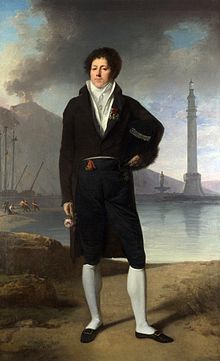Joseph Forlenze
Joseph-Nicolas-Blaise Forlenze (born February 3, 1757 in Picerno , Italy , † July 22, 1833 in Paris , France ; born as Giuseppe Nicolò Leonardo Biagio Forlenza ) was an Italian ophthalmologist and surgeon . He is known as one of the most important ophthalmologists of the 18th and 19th centuries. He was particularly known in France for his cataract operations during the First Empire .
Life
Forlenze was born in Picerno ( Basilicata , then part of the Kingdom of Naples ) into a family of doctors. His parents were Felice and Vita Pagano. His father Felice and his uncles Sebastiano and Giuseppe were handcraft surgeons from the noble Capece Minutolo family from Ruoti . After studying his Catechism on Ruoti, he moved to Naples , where he began studying surgery. In France he continued this under Pierre-Joseph Desault , with whom he befriended, and whose collaborator he was in the joint anatomy studies .
Forlenze then moved to England , where he spent two years, and expanded his knowledge at St George's Hospital in London , then under the direction of John Hunter . He also traveled to the Netherlands and Germany . After returning to France, he started working as an ophthalmologist. He differentiated between various eye diseases and depicted them using wax masks .
In 1797, in the presence of a committee from the institute and some members of the government as well as French and foreign scientists, he performed an eye operation in a nursing home in Paris . In 1798 he became a surgeon at the Hôtel des Invalides and Hôtel-Dieu (Paris) , where he performed many remarkable operations.
Forlenze healed soldiers from Napoleon's army who returned from the Egyptian expedition with serious eye diseases. He also healed well-known figures such as Jean-Étienne-Marie Portalis , Minister for Religious Affairs , and the poet Ponce Denis Lebrun , for whom he restored the sight of an eye that had been covered by a cataract for twelve years . Lebrun dedicated a verse to him in his ode called Les conquêtes de l'homme sur la nature (man's conquest of nature). With a royal decree, Napoleon appointed him "chirurgien oculiste of the Lyceen, the hospices and all free welfare services of the empire". As a result, Forlenze was sent to the provinces to practice as an ophthalmologist.
His achievements spread to Italy , where he operated for free in cities such as Turin and Rome . In Rome he healed Cardinal Doria and was publicly honored by Caroline de Bourbon . His work Considérations sur l'opération de la pupille artificielle (1805) is valued as one of the most important medical works of the time. Forlenze died on July 22, 1833 of a stroke in the Café de Foy in Paris, where he often spent his evenings.
Fonts
- Considérations sur l'opération de la pupille artificielle , 1805
- Notice sur le développement de la lumière et des sensations dans les aveugles-nés, à la suite de l'opération de la cataracte , 1817
to honor
-
 Legion of Honor , Knight
Legion of Honor , Knight -
 Order of St. Michael and St. George , honorary member
Order of St. Michael and St. George , honorary member
Individual evidence
- ↑ a b Rabbe, Sainte-Preuve, Biographie universelle et portative des contemporains , Chez l'éditeur, 1836, p. 1721.
-
↑ O lyre, ne sois pas ingrate!
Qu'un doux nom dans nos vers éclate
Brillant comme l'astre des cieux!
Je revois sa clarté première;
Chante l'art qui rend la lumière;
Forlenze a dévoilé mes yeux.
Joseph Fr. Michaud, Louis Gabriel Michaud, Biographie universelle, ancienne et moderne , Michaud frères, 1838, p. 263. - ^ Jan Ellen Goldstein, Console and Classify. The French Psychiatric Profession in the Nineteenth Century , Chicago Press, 2002, p. 63.
- ^ Salvatore De Renzi, Storia della medicina Italiana, Volume 5 , Filiatre-Sebezio, 1848, p. 430.
- ^ Almanach royal pour l'an MDCCCXXX , Testu et cie, 1830, p. 283
literature
- Jan E. Goldstein : Console and Classify. The French Psychiatric Profession in the Nineteenth Century. Chicago Press, 2002.
- Rabbe, Sainte-Preuve: Biography universelle et portative des contemporains. Chez l'éditeur, 1834.
- Marie-Nicolas Bouillet , Alexis Chassang (eds.): Dictionnaire universel d'histoire et de géographie , Hachette, 1878.
Web links
- Joseph Forlenze's Biography (Italian)
- Literature by and about Joseph Forlenze in the SUDOC catalog (Association of French University Libraries )
| personal data | |
|---|---|
| SURNAME | Forlenze, Joseph |
| ALTERNATIVE NAMES | Forlenze, Joseph-Nicolas-Blaise (full name); Forlenza, Giuseppe Nicolò Leonardo Biagio (maiden name) |
| BRIEF DESCRIPTION | Italian ophthalmologist and surgeon |
| DATE OF BIRTH | February 3, 1757 |
| PLACE OF BIRTH | Picerno , Italy |
| DATE OF DEATH | July 22, 1833 |
| Place of death | Paris , France |
